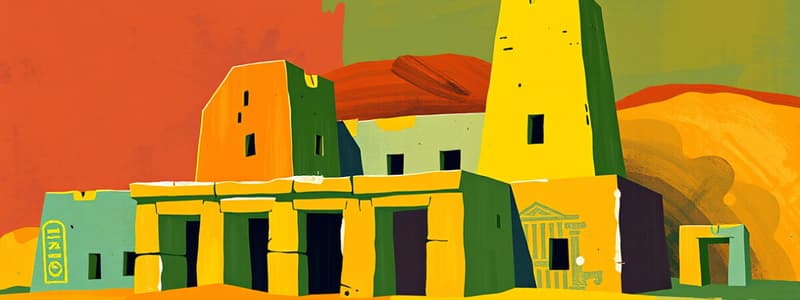Podcast
Questions and Answers
Paleolithic sites of ______ in France and ______ in Spain were famous for cave paintings.
Paleolithic sites of ______ in France and ______ in Spain were famous for cave paintings.
Lascaux, Altimira
The '_____' figures of Willendorf, Lespugue, and Lausell symbolize fecundity.
The '_____' figures of Willendorf, Lespugue, and Lausell symbolize fecundity.
Venus
Neolithic people erected megalithic structures called _____ in England.
Neolithic people erected megalithic structures called _____ in England.
Stonehenge
The ________ at Giza is a lavish tomb built by the ancient Egyptians for their pharaohs.
The ________ at Giza is a lavish tomb built by the ancient Egyptians for their pharaohs.
The tomb for Queen Hatshepsut is located at ______.
The tomb for Queen Hatshepsut is located at ______.
The Egyptians constructed magnificent temples at ______ and ______.
The Egyptians constructed magnificent temples at ______ and ______.
The _______ of the palace of King Assurbanipal recorded the victories of the Assyrian warrior king.
The _______ of the palace of King Assurbanipal recorded the victories of the Assyrian warrior king.
The classical period of architecture and art is best represented by the civilization of the ancient ______.
The classical period of architecture and art is best represented by the civilization of the ancient ______.
The Greeks of the classical period were fascinated by ______.
The Greeks of the classical period were fascinated by ______.
The amazing innovations of Classical Greek art had their origins in earlier civilizations like the ______ of Crete.
The amazing innovations of Classical Greek art had their origins in earlier civilizations like the ______ of Crete.
The Minoan palace at ______ is known for its lively wall paintings.
The Minoan palace at ______ is known for its lively wall paintings.
The Minoans produced increasingly sophisticated terracotta and bronze figurines and painted _____.
The Minoans produced increasingly sophisticated terracotta and bronze figurines and painted _____.
Frescoes of ______ games can be found in the palace of Knossos.
Frescoes of ______ games can be found in the palace of Knossos.
The Mycenaeans on mainland Greece were considered more _____ than the Minoans.
The Mycenaeans on mainland Greece were considered more _____ than the Minoans.
The Mycenaeans produced beautifully crafted work in gold, such as ______.
The Mycenaeans produced beautifully crafted work in gold, such as ______.
The earliest period of Greek city-state civilization is known for its vase painting, specifically the ______.
The earliest period of Greek city-state civilization is known for its vase painting, specifically the ______.
Flashcards are hidden until you start studying
Study Notes
Paleolithic Art
- Over 20,000 years before recorded history, humans created early art, including animal paintings in cave systems.
- Significant Paleolithic sites include Lascaux in France and Altamira in Spain.
- Stone statuettes representing fertility, known as "Venus" figures, like the Venus of Willendorf, Lespugue, and Lausell.
Neolithic Structures
- Neolithic people constructed megalithic structures for rituals and celestial observations.
- Stonehenge in England is a notable example of such constructions.
Ancient Egyptian Architecture
- The ancient Egyptians built elaborate tombs for pharaohs, with the Great Pyramid of Khufu at Giza being the most famous.
- Mortuary temples, like Hatshepsut's temple located at Deir El-Bahri, were built into cliff sides.
- Magnificent temples were constructed at Karnak and Luxor, characterized by massive stone columns and heavy walls along a central axis.
Assyrian Art
- Assyrian monuments and relief carvings depicted warrior kings' victories and hunting scenes.
- The Lion-Hunting Reliefs from the palace of King Assurbanipal display dynamic energies, contrasting with the more serene Egyptian art.
Classical Greek Civilization
- The classical period in art and architecture is epitomized by ancient Greek civilization, particularly Athenian accomplishments in various fields.
- The Greeks placed great emphasis on physical beauty, with their sculptures, architecture, and paintings reflecting idealized forms.
Influence of Earlier Cultures
- Innovations of Classical Greek art drew inspiration from earlier Minoan civilization in Crete and Mycenaean culture on the mainland of Greece.
Minoan Contributions
- Minoans thrived from approximately 2500-1400 B.C.E., with the palace at Knossos known for vibrant wall paintings depicting leisure and sea themes.
- They produced sophisticated terracotta and bronze figurines and painted vases.
- Frescoes in Knossos depict bull-leaping games, possibly linked to the legend of Theseus and the Minotaur.
Mycenaean Society
- Mycenaeans were characterized as more warlike but engaged in trade with Minoans, adapting their cultural practices post-Crete's destruction.
- Mycenaean civilization fell around 1100 B.C.E., leading to a cultural resurgence after three centuries, resulting in city-state organization and trade expansion.
- They created exquisite gold artifacts like face masks and used the bull symbolically in a more aggressive context, often featured in their weaponry decorations.
Early Greek Civilization
- The earliest Greek city-state civilization produced exemplary art, notably in vase painting, focusing on precise and simple designs.
Studying That Suits You
Use AI to generate personalized quizzes and flashcards to suit your learning preferences.




